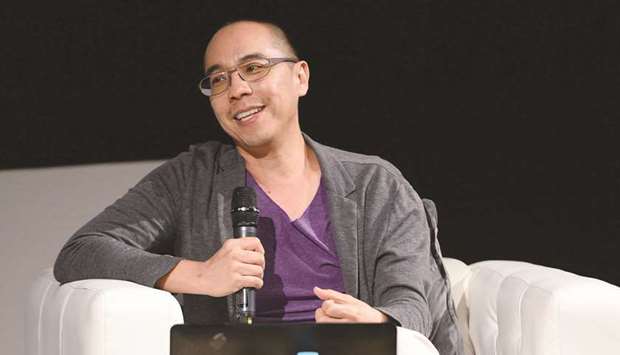Cannes Palme d’Or-winning Thai filmmaker and visual artist Apichatpong
Weerasethakul presented a compelling notion before emerging filmmakers
at Qumra 2018: The distant possibility of hooking up all the brains in
the world to share their dreams.
“We will no longer need cinema then,” he said, underpinning his own
meditative approach to film as a medium that is after all, “evolved from
dreams”.
Weerasethakul’s masterclass took audiences on his original journey in
cinema, shaped by the collective memory of his own and his friends, and
shaped from their dreams.
He connected dreams to movies, reminding audiences of the four cycles of
the brain while one is at sleep, and concluding that “movies evolved
from this”. He said sleep is “like cinema but much better, as various
scenarios from our memories play out.”
For him, the art of making films is to exorcise these memories and lay
them out bare. In today’s world, where message distortion and fake news
thrive, his own interpretation of storytelling and history is that they
are “devices to bluff memories and to manipulate them”.
Weerasethakul was also vocal about the concerns that he sees as a
filmmaker in Thailand’s contemporary political scene. At one point, he
speculated how his own cinematic interpretations and visual
installations could be perceived by the military authorities, and told
about how several of his friends had their social media accounts
monitored and were sent to camps “for attitude adjustment,” where they
are “tortured psychologically”.
He also presented a captivating presentation on his journey, taking
audiences through visuals of his hometown, the people and places that
shaped his memories, and his cutting-edge installations that interpolate
cinema, art, visuals and theatre, into something that is singularly
mysterious.
Weerasethakul said he is not overtly concerned about whether his works would be understood for what he intended.
“After a screening of my movie, one person got very angry and demanded a
refund. I obliged. Over time, I have come to care less and less about
such responses because what matters is how honest you are. If you
believe in conventional cinema go for it but make it the best,” he said.
“You are your first audience and you must be truthful to yourself.”
Urging young talents not to be let down by criticism, he reminisced how
his teacher had asked him to “go back to school and learn filmmaking”
after watching his film.
Discussing his movies, including the Palme d’Or winning Uncle Boonmee
Who Can Recall his Past Lives, Weerasethakul said his fascination for
cinema was shaped by the works of Steven Spielberg (ET and Close
Encounters of the Third Kind).
“The way he deals with science fiction, and how he introduced a lot of
smoke and backlighting”, fascinated the young boy,” he said.

Apichatpong Weerasethakul speaks on stage during his Masterclass at Qumra 2018.
